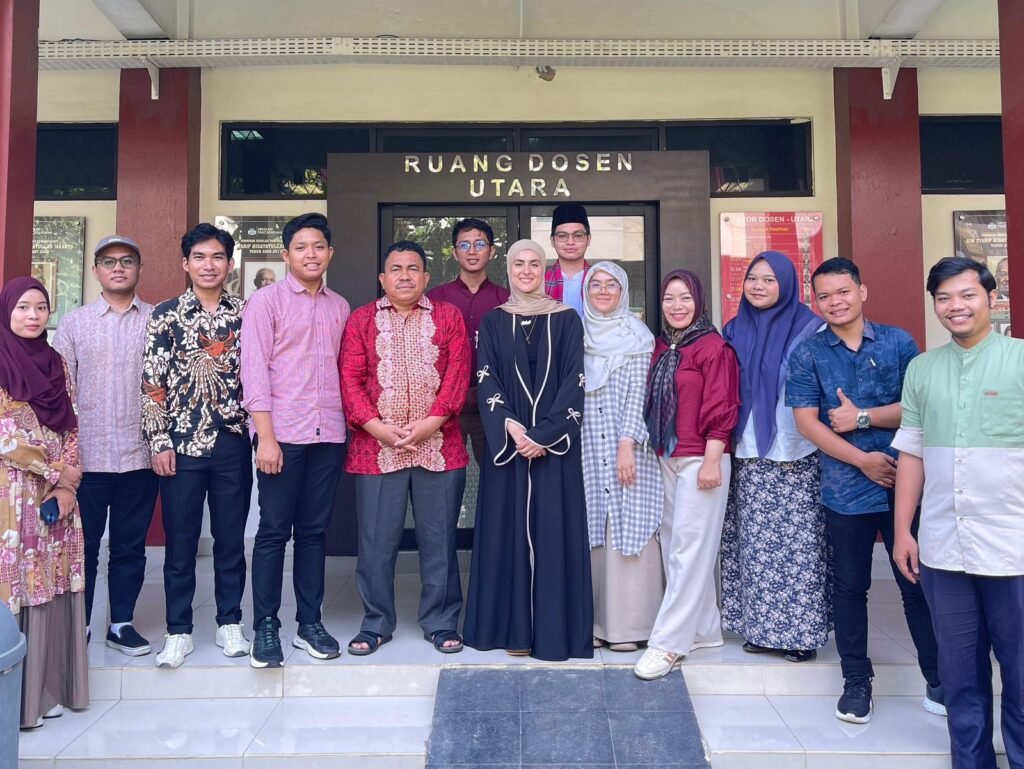
By IWDN Research and Technology Hub — Based on discussion with Mrs. Sibel Rania Mayuk, Researcher, Friedrich Alexander Universität Erlangen-Nürnberg, Germany
Jakarta is a city of paradoxes. It is the epicenter of traffic and transformation, of chaos and creativity, of traditional prayer calls echoing through digital skylines. In this vibrant metropolis, where mosques stand beside malls and hijab-wearing women lead technology startups, the lived experience of Islam in Indonesia becomes not only a religious identity but also a cultural force deeply embedded in everyday life.
Mrs. Sibel Rania Mayuk, a researcher from Friedrich Alexander Universität in Erlangen-Nürnberg, Germany, came to Indonesia with a particular mission: to explore how Islam is practiced in a predominantly Muslim society that is pluralistic, democratic, and multicultural. Her inquiry, which formed the heart of our recent discussion at UIN Syarif Hidayatullah Jakarta, revolved around a fundamental question: How do universal Islamic values manifest in Indonesia’s local realities?
The answer, as with many aspects of Indonesian life, lies in negotiation, adaptation, and synthesis.
A Religion, A Civilization, A Culture
Islam is often spoken of in universal terms: peace, justice, mercy, and equality. These are values found in the Qur’an and upheld across the Muslim world. But what makes Indonesia distinct is how these values are expressed through cultural forms that are local, flexible, and often hybrid.
Unlike many countries where Islam arrived through conquest, Islam came to Indonesia through trade, Sufi missionaries, and intellectual exchange. From the 13th century onwards, it was woven into the social fabric through localized practices rather than imposed structures. That is why in Indonesia, Islamic rituals often coexist with cultural expressions such as slametan communal meals, batik motifs with Quranic verses, or traditional wayang stories infused with Islamic teachings.
In our discussion, Mrs. Mayuk emphasized that Indonesia offers a living example of how Islamic ethics are not diminished by local culture, but rather enriched by it. “I see Islam here not only as a faith but as a way of life that is harmonized with the local environment,” she noted. “That pluralism is not a weakness—it is the very source of its resilience.”
From Pesantren to Smart Cities
One of the most striking features of Indonesian Islam today is how it navigates modernity. Traditional Islamic boarding schools, or pesantren, continue to educate millions while integrating STEM curricula. Muslim scholars debate AI ethics and digital economy in light of Islamic jurisprudence. Women scholars, activists, and public intellectuals—like Oki Setiana Dewi—occupy prominent roles in shaping both spiritual and public discourse.
In Jakarta, which is being developed as a smart city, Islamic values are also entering new domains. Zakat platforms operate online. Green mosques promote sustainability. Islamic fintech startups support small businesses. As Mrs. Mayuk observed, “In many Western discourses, religion and technology are often seen in tension. But here, they evolve together.”
This synthesis does not happen without friction. The growing influence of conservative movements, the politicization of religion, and economic inequality all pose serious challenges to the inclusivity that Indonesian Islam has long nurtured. Yet, these challenges also trigger renewed efforts for reform, dialogue, and grassroots engagement—often led by Muslim youth.
Islam as Ethical Infrastructure
What emerges from the Indonesian experience is the idea of Islam not just as a personal belief system, but as an ethical infrastructure that supports social cohesion in a diverse nation. The state ideology of Pancasila—with its recognition of belief in one God, humanity, unity, democracy, and justice—echoes the core values of Islamic teaching while remaining inclusive of other religions.
Indeed, Islam in Indonesia operates in a unique constitutional framework. It is neither a secular rejection of religion nor a theocratic imposition of one interpretation. Rather, it is a democratic negotiation of values in a public sphere shared by many.
This makes Indonesia a case worth global attention—especially in a time when debates about Islam are often reduced to binaries: modern or traditional, tolerant or radical, East or West.
A Model for Global Muslim Societies?
As we ended our dialogue, Mrs. Mayuk reflected on what Indonesia can teach the world. “Indonesia does not claim to represent the only way to be Muslim. But it shows that there are many ways—and that diversity is not the enemy of unity, but its condition.”
In an age where pluralism is under threat, where identity is weaponized, and where religion is often misunderstood, Indonesia’s experience provides a hopeful narrative. A narrative where Islam is both universal and local, faithful and flexible, rooted and responsive.
And in this story, Jakarta stands as more than a city. It becomes a metaphor for a modern Muslim society: dynamic, imperfect, but always striving to build bridges—between the past and future, between the global and the local, and between faith and humanity.